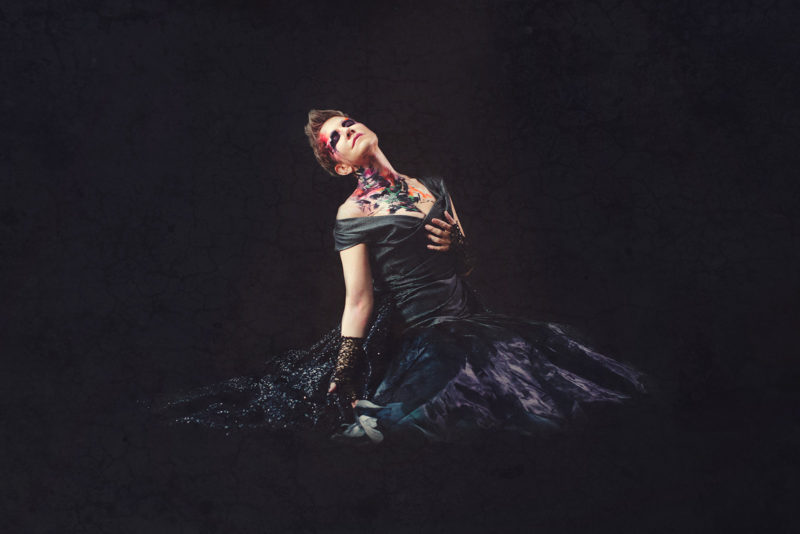JOYCE DIDONATO AT NATIONAL CONCERT HALL
There are many pleasures along the way. At the heart of it all, DiDonato’s voice is as beautiful, richly‑coloured and agile as ever, and she proves a compelling advocate for her material."
GoldenPlec

Joyce DiDonato, with Il Pomo d’Oro, at National Concert Hall, on 8 June 2017
That this is no ordinary concert is clear before even entering the auditorium. On the programme stands there are cards for everyone in the audience, inviting answers to the question ‘in the midst of chaos, how do you find peace?’
Joyce DiDonato, touring with period-instrument ensemble Il Pomo d’Oro, has themed this concert ‘In War and Peace: Harmony Through Music’. Once inside, the lighting is low, there is a smudge of dry ice in the air, and there is the singer herself, seated statue-like at the rear of the stage while at the front a male figure lies on the ground, his body twisted like a torso from a baroque painting.
The theatricality continues with the concert, with DiDonato’s flowing designer gowns and physical gestures, occasional interventions of dancer/choreographer Manuel Palazzo (who nevertheless avoids baroque dance, clearly still a step too far even for early-music fans), and abstract animations projected on the back wall, video-art style. The sophisticated presentation is matched by the eclectic and themed programme, centring on music by Handel and Henry Purcell: the first half evoking the experience of war and conflict with a second half all peaceful reverie and hopeful victory. It’s creative and engaging and far from being a didactic slog, though the intention is clear: we need art, now more than ever.
There are many pleasures along the way. At the heart of it all, DiDonato’s voice is as beautiful, richly-coloured and agile as ever, and she proves a compelling advocate for her material. The aria Prendi quel ferro, o barbaro [take the sword you monster] from Leonardo Leo’s opera ‘Andromaca’ brings in a feverish intensity, sung with fabulous power, contrasted with moments of deep tenderness.
The ensemble, mainly conducted from the harpsichord by Maxim Emelyanychev (in an instrumental piece by Cavalieri he proves a more than capable cornettist as well), accompany with easy sensitivity. They bring a warm Italianate energy and transparency to the music of Purcell, with a superbly-judged segue from the Chacony in G minor into Dido’s Lament from ‘Dido & Aeneas’. DiDonato projects a wonderful sense of stillness, as her voice in the Lament explores ever darker hues.
This contrasts boldly with what follows, the aria Pensieri, voi mi tormentate [thoughts, you persecute me] from Handel’s ‘Agrippina’, the bracing intensity of DiDonato’s opening phrase superbly matched by the playing of solo oboist Roberto de Franceschi. The programme offers many turns like this. Her gentle singing of Handel’s Lascia ch’io pianga, her embellishments understated, to a backdrop of falling petals, will certainly last in the memory.
While the anguish of the first half is perhaps missed in the more peaceful strains that follow the interval, it nevertheless includes a beautiful instrumental performance of Arvo Pärt’s Da Pacem, Domine, a piece composed just two days after the 2004 Madrid train bombings, in memory of its victims.
The final pair of Handel arias allows the programme to close on a note of brilliance. Augelletti, che cantate [little birds that sing] from ‘Rinaldo’ features the extraordinary sopranino-recorder playing of Anna Fusek—another multi-instrumentalist, having played the rest of the concert as a second violinist. Meanwhile, DiDonato reminds us of her coloratura virtuosity one last time in a fast—perhaps over-fast—rendering of the aria Da tempeste from ‘Giulio Cesare’.
The audience come to their feet and, after sustained applause, DiDonato returns to sing two encores, one baroque (un-named) and the other more recent. Between them, she stops to reflect on her programme, clearly a gathering of favourites, explaining how it grew as a response to the Paris terror attacks in November 2015, recalling composer Jonathan Larson’s words that “the opposite of war isn’t peace—it’s creation”.
And, with that, she bids us farewell with perhaps the most surprising musical offering of the night, evoking the mystery of the sun rising each morning in the Richard Strauss song Morgen [morning], here accompanied by baroque violin, lute and cello. Transcending centuries, it creates a moment that is thoughtful, inspired, and deeply moving.
Programme:
George Frideric Handel: ‘Scenes of horror, scenes of woe’ (Jephtha)
Leonardo Leo: ‘Prendi quel ferro, o barbaro!’ (Andromaca)
Emilio dei Cavalieri: Sinfonia (Rapprasentatione di anima e di corpo)
Henry Purcell: Chacony in G minor; ‘Dido’s Lament’ (Dido & Aeneas)
Handel: ‘Pensieri, voi mi tormentate (Agrippina)
Carlo Gesualdo: ‘Tristis est anima mea’ [instrumental]
Handel: ‘Lascia ch’io pianga’ (Rinaldo)
Purcell: ‘They tell us that your mighty powers’ (The Indian Queen)
Handel: ‘Crystal streams in murmurs flowing’ (Susanna)
Arvo Pärt: Da Pacem, Domine
Handel: ‘Augelletti, che cantate’ (Rinaldo); ‘Da tempeste il legno infranto’ (Giulio Cesare)
By Michael Lee
More at GoldenPlec
